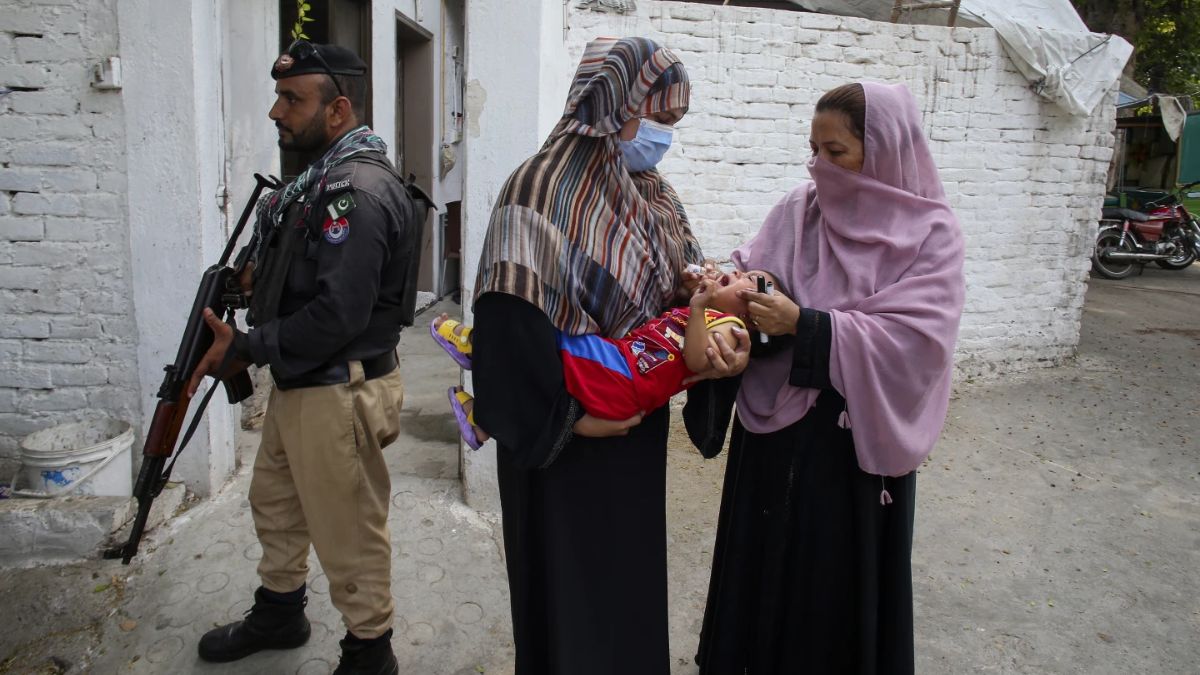Polio has started to spread again in Pakistan, with over 1 million children missing their vaccination doses last month. Violence targeting health workers and the police guarding them has delayed years of efforts to make the country polio-free.
Since January, Pakistan has recorded 39 new polio cases, a sharp rise compared to just six cases last year, according to Anwarul Haq, National Emergency Operation Centre for Polio Eradication.
The latest cases of wild poliovirus type 1 (WPV1) in Pakistan include three in Balochistan, two in Sindh, and one in Khyber Pakhtunkhwa.
Polio, a highly infectious disease that leads to crippling paralysis in young children, has been nearly eradicated worldwide following decades of vaccination campaigns. However, Pakistan and Afghanistan remain the last countries where polio is still endemic. There is no cure for polio, and the paralysis caused by the infection is irreversible.
Ayesha Raza Farooq, Pakistan Prime Minister’s Focal Person for Polio Eradication, said, “This should be a wake-up call for all parents and communities.”
“Every paralytic polio case means there are hundreds of children who are silently affected by poliovirus and are potentially carrying and spreading it throughout their communities.”
Vaccination campaigns in Pakistan
A new nationwide polio vaccination drive is set to begin on October 28 to immunise at least 32 million children across Pakistan. “The whole purpose of these campaigns is to achieve the target of making Pakistan a polio-free state,” Anwarul Haq said.
The new polio cases in regions outside the usual hotspots are worrying the Pakistani authorities. Earlier, most cases were concentrated in the restive northwest near the Afghanistan border, where in September the Taliban government suddenly halted door-to-door vaccination efforts.
Afghanistan and Pakistan remain the only two countries where the spread of polio has never been completely stopped. Pakistani officials fear the Taliban’s decision will have consequences beyond Afghanistan due to the frequent travel between the two countries.
The World Health Organization (WHO) has confirmed 18 polio cases in Afghanistan this year, with all but two in the southern region - a rise from six cases in 2023. Afghanistan reintroduced a house-to-house vaccination strategy in June for the first time in five years, which the WHO said helped reach most targeted children.
Now, Pakistani health officials are calling for coordinated polio vaccination campaigns on both sides of the border.
Rise in attacks against vaccination clinics
Pakistan frequently conducts polio vaccination campaigns, however, these efforts have long been hampered by militant attacks. For decades, militants have targeted these campaigns, with false claims that the vaccines are part of a Western conspiracy to sterilise Muslim children.
Allegations that US intelligence officials used a fake immunisation programme in Abbottabad during the 2011 operation to capture Osama bin Laden have further raised fears about vaccination campaigns, CNN reported.
Religious beliefs and limited awareness of the risks caused by polio have further hampered public health efforts. Despite intense efforts by international NGOs and Pakistani authorities to fight misinformation and vaccinate children, rumours and false claims continue to undermine vaccination drives.
In the northwestern Khyber Pakhtunkhwa province alone, there have been 27 attacks on polio workers this year, CNN reported citing police sources. Hardline clerics and militants have fuelled this resistance, leading many communities to avoid vaccination.
In September, armed militants killed a police officer guarding a polio vaccination site in Bannu, leading to protests. That same month, a police officer and a polio worker were shot dead in Bajaur.
Aftab Kakar, a representative for the Emergency Operation Center in Balochistan, stated that protests, security issues, and community boycotts have disrupted vaccination campaigns “leaving a cohort of missed children who could sustain virus transmission.”
He added that in some cases, health workers have incorrectly marked children as vaccinated when they have not received the vaccine.
What’s next?
Despite the recent rise in polio cases, Pakistani authorities remain hopeful that they can stop the spread of the virus. The country will launch a new nationwide polio vaccination campaign on October 28.
Pakistan’s Polio Eradication Programme posted on social media that “Polio eradication is Pakistan’s top priority.”
“A unified plan with provinces aims to stop polio transmission by 2025.”
With inputs from agencies
)